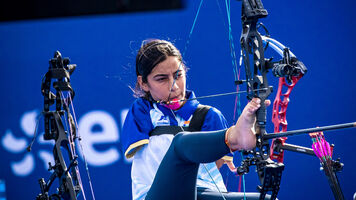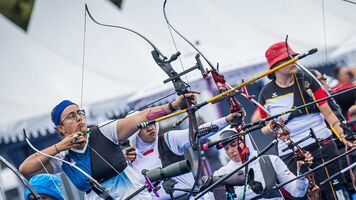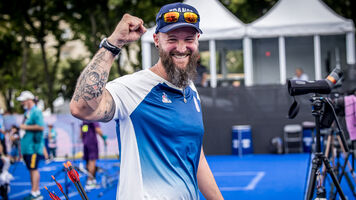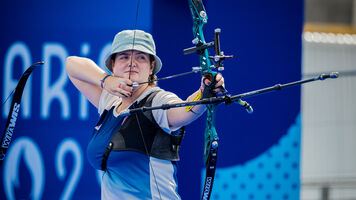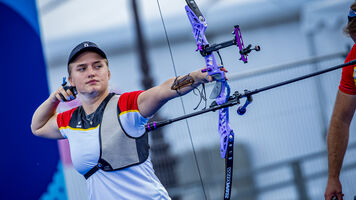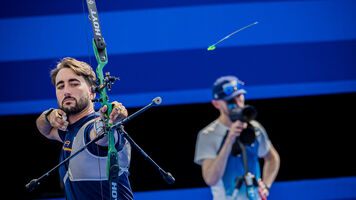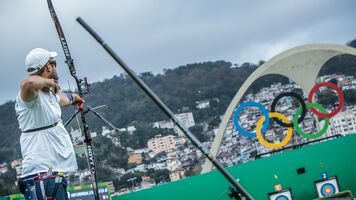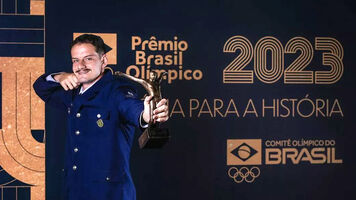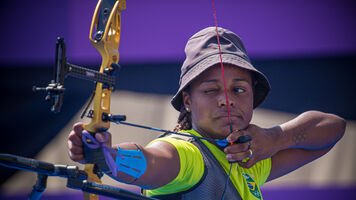Surviving at the top: Olympic medallist Aida Roman

A full version of this article was originally published by Bow International.
Twenty years ago, Aida Roman skipped a gymnastics class to accompany her father to an archery course. At the age of 10, watching a handful of Mexico City’s eight million inhabitants shoot wooden arrows with wooden bows at wrapped straw targets, she fell in love with the sport.
Thirteen years later, she climbed the Olympic podium.
“I remember I thought it was beautiful,” she says. “At first, I was angry with my dad for having to miss my class but when we arrived to the place, I embraced the opportunity to learn something new.”
“I asked my dad if I could try it and I loved it. One month later, I was shooting my first competition.”
In 2007, she made the Mexican national team – and hasn’t been off it since.
“I remember I had the lowest scores among the team in training, but when I went back home and had to shoot the selection tournament, I beat all the other girls,” she recalls.
Growing up in a problematic neighbourhood in Mexico City, Aida’s daily routine was going from home to school, from school to archery, and from archery back home.
It was a childhood with few friends and the permanent protection of her parents.
“Archery has given me many things but one I value a lot is freedom. Where I grew up the possibilities of ending up pregnant at very young age, addicted to drugs or even missing were pretty high. If it wasn’t for the sport, I might have not be where I am today,” says Aida.
“Archery opened my world and I cling to that. I discovered that I can be good at something that feels unique because in my country, despite its history, archery is still a relatively new sport.”

The Olympic medal
In 2012, her face was all over the Mexican newspapers, television and radio stations, as people learned the name Aida Roman.
She became an Olympic silver medallist at the Games held in London that year, where Mexico also took individual bronze in the recurve women’s competition courtesy Aida’s teammate Mariana Avitia. It was a huge surprise, as Mexico was almost unknown as an archery nation.
“It changed my life completely,” says Aida. “I have gained personal fame, and national and international recognition.”
“I have gained memories from people from all around the world that tell me how moved they felt when I won, what they were doing or with who they watched my match, and that’s something I just love.”
“But it also has a negative side. Your life is exposed to the media, and in Mexico, the media is opportunist.”
Two years after she won the Olympic silver, Aida had one of her best archery seasons to date. In 2014, she won the World Archery Indoor Championships in Nimes, France and the Archery World Cup Final in Lausanne, Switzerland.
She cemented her status as one of the best recurve women in the world but for Mexico she was still ‘the Olympic silver medallist’:
“I think no matter what I achieve, even if the champion titles might have been more difficult for me to win, I will always be the Olympic medallist. For some people, for the media, the rest will always come second.”
It was a fame she brought to the latest edition of the Games in Rio de Janeiro, Brazil in 2016, where she lost in the first round to Alexandra Mirca of Moldova in five sets, 6-4, and broke down in tears to a broadcast camera immediately afterwards.
“It was hard. I have never promised anything to anyone but the media will use whatever I say to their own benefit. They put the responsibility of more 120 million Mexicans on me because I previously won one medal, and it affected me,” she admits.
“Some of the titles were hurtful and some of the media was rude to me, so I blocked them. There are some reporters I don’t talk with or I don’t give interviews to because of that. But there are others that are good, that will care about me as a person and not just as the athlete, and that, I value.”

The future
At the Mexico City 2017 Hyundai World Archery Championships, Aida, with Mariana Avitia and Alejandra Valencia, secured the recurve women’s team silver medal on home soil, losing to just Korea in the final.
Now 30 years of age, Aida boasts a career that includes an individual world indoor title, plus a silver, and two world outdoor second place finishes – one in teams and one in mixed. Plus that Hyundai Archery World Cup crown from 2014.
It’s with the team that her future Olympic hopes rest.
“To win a medal with the team at the Olympics. We have been so close and so far, that’s still a dream. I hope one day we can make it happen,” she says.
That team also relies on Aida Roman; positive and optimistic yet highly experienced, she has the temperament of a champion in archery.
“If today wasn’t a good day, move on. Tomorrow will be different and you can try to turn the situation around. Fix it, whatever it is, because otherwise, you will be stuck forever,” she says.
“In archery you don’t depend on others, you only depend on yourself.”
Read the full interview on the Bow International website.


